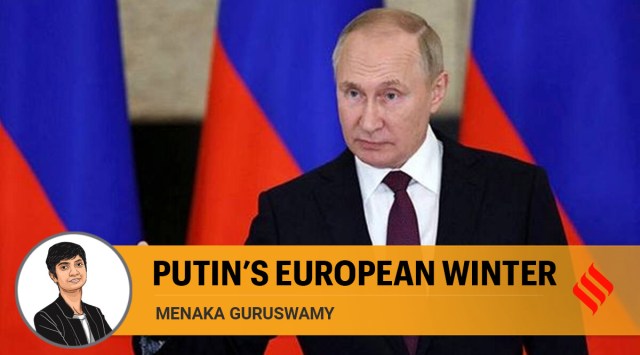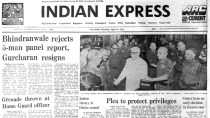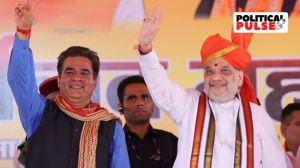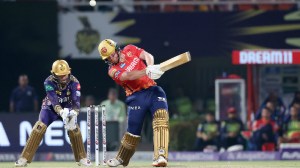- India
- International
Winter is coming: Europe without Russia’s gas supply could face a harsh season
Menaka Guruswamy writes: As we get closer to yet another European winter, will history repeat itself and will Russia triumph militarily over Ukraine and also win the gas war with the continent? Or will Ukraine write a fresh chapter in this saga of war in Europe’s winter?
 Menaka Guruswamy writes: Putin’s shutdown means that Europe will likely face a very cold winter. And that’s not all. (Reuters)
Menaka Guruswamy writes: Putin’s shutdown means that Europe will likely face a very cold winter. And that’s not all. (Reuters)Russia’s invasion of Ukraine, and the unexpectedly sturdy fight put up by the much smaller nation has led to dramatic consequences. Russia provides a substantial amount of natural gas through a pipeline to Europe. In early September, annoyed with Western military support for Ukraine and sanctions, Russian Premier Vladimir Putin turned off Nord Stream, the natural-gas pipeline. Nord Stream is controlled by Gazprom PJSC, a Russian state producer.
Even before the shutdown, the Atlantic Council, an American think tank, estimates that Russia had reduced its supply of natural gas to Europe by almost 40 per cent. In anticipation of such a cut-off, Europe has stockpiled gas up to 82 per cent of its storage capacity. The use of natural gas as an instrument of foreign policy by Putin is not a phenomenon only surfacing now.
Putin’s control over Gazprom was planned in 2000. In Putin, the new biography by Philip Short, the author describes how the Russian premier decided to bring oil and gas — which account for half of Russia’s export earnings — under his personal control. At the time Russia had only five board seats on Gazprom in contrast to other private parties and oligarchs who had six seats. The private parties were rumoured to be siphoning away $2-3 billion out of Gazprom every year and were hostile to the Kremlin having a say in the company.
Short writes that Putin summoned the then CEO Rem Vyakhirev in October 2000 for an hour-long private meeting, after which Vyakhirev resigned as CEO without giving any reasons. The Russian premier soon installed a loyalist as CEO and chairman of the board, after which Gazprom’s shares on the London Stock Exchange shot up by 134 per cent.
Putin’s shutdown means that Europe will likely face a very cold winter. And that’s not all. The European economy — already reeling from the after-effects of the pandemic and the war in Ukraine — will likely be pushed to the “brink of a recession”, as the Wall Street Journal (WSJ) writes. As the WSJ explains, Europe’s economy has long relied on steel makers, chemical producers, and car manufacturers — all energy-intensive industries. With the shortage of cheap Russian natural gas, power has become more expensive and as a result, some industries are forced to close or reduce their hours of work.

European winters are legendary and have played a critical role at various points in history. Putin and the Russians know a thing or two about how to deploy the cold when battling adversaries. Russian children are taught about the Soviet Union’s greatest victory: Stopping Hitler’s 30,00,000 men and Germany’s technologically superior army in the suburbs outside Moscow in the winter of 1941.
Let’s step back in time to World War II. By June 1941, the Germans — having conquered France in six weeks — rolled into the Soviet Union. They looked unstoppable. By mid-July, the Germans had advanced 400 miles into Russia and were only 200 miles away from Moscow. But by late October 1941, the Russian winter was setting in. The Germans were confronted with harsh sub-zero temperatures by November. Their equipment and soldiers were diminished by the extreme cold, whereas the Soviets, used to these conditions, fought on. As the German troops battled frostbite, the Red Army launched its winter counter-offensive and took back significant territories. With this, World War II turned in favour of the Allies, of which the Soviet Union was a part.
Putin will now wait and watch as Europe struggles to cope with its long winter. Unlike in India, where buildings are rarely centrally air-conditioned or heated, in the Western world, gas is essential not just to run cars and industries but for central heating, ubiquitous in offices and homes — their civilisation survives on central heating. Having spent a winter in Berlin, I still remember the city being enveloped by darkness by 3:00 pm and the brutal cold outside. Much of Europe, barring a few countries, experience temperatures of minus degrees Celsius, only a few hours of daily sunlight, heavy snowfall and frequent snowstorms.
To cope with the limited supply of natural gas, European governments are aiming to reduce gas consumption. Urged repeatedly by their governments, Europeans have reduced their consumption of natural gas-related resources by over 10 per cent in August (as compared to previous years) alone. But, it’s one thing to reduce demand for heat and power in August and quite another to do so in the middle of winter.
However, the military fight back now is coming from the Ukrainians. As numerous media outlets have reported, Russian troops are retreating in the Kharkiv region. The BBC reported last week that Ukrainian forces have retaken 3,000 square kilometres in a matter of a few days. The BBC also reports that the Russian defence ministry has confirmed that the Russian-held supply towns of Izyum and Kupiansk have been yielded to Ukrainian forces.
If that is the case, then it’s quite possible that the Ukrainians might be turning the corner in this war. As we get closer to yet another European winter, will history repeat itself and will Russia triumph militarily over Ukraine and also win the gas war with the continent? Or will Ukraine write a fresh chapter in this saga of war in Europe’s winter? In the 80 years since World War II much has changed in the world — the United Nations is meant to keep peace and modern technology is meant to give superior militaries the ability to dominate wars. We are apparently meant to be less reliant on non-renewable natural resources for our daily existence. The Russia-Ukraine war seems to show otherwise — that the United Nations is irrelevant and that winning wars is still about fighting spirit, not just superior equipment. Eventually, it might just boil to who weathers a harsh cold winter without natural gas better — both in homes and on the battlefield.
The writer is a Senior Advocate at the Supreme Court
EXPRESS OPINION
More Explained
Apr 26: Latest News
- 01
- 02
- 03
- 04
- 05










































